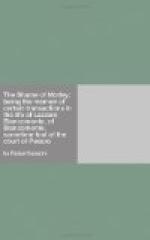“Poeta nascitur” the proverb runs, and that proverb’s truth was doubtless forced home upon the Lord Giovanni at an early stage of his excursions into the flowery meads of prosody. Fortunately he lacked the supreme vanity that is the attribute of most poetasters, and he was able to see that such things as after hours of midnight-labour he contrived to pen, would evoke nothing but her amusement—unless, indeed, it were her scorn— and render him the laughing-stock of all his Court.
So, in the wisdom of despair, he came to me, and with a gentleness that in the past he had rarely manifested for me, he asked me was I skilled in writing verse. There were not wanting others to whom he might have gone, for there was no lack of rhymsters about his Court; but perhaps he thought he could be more certain of my silence than of theirs.
I answered him that were the subject to my taste, I might succeed in throwing off some passable lines upon it. He pressed gold upon me, and bade me there and then set about fashioning an ode to Madonna Paola, and to forget, when they were done, under pain of a whipping to the bone, that I had written them.
I obeyed him with a right good-will. For what subject of all subjects possible was there that made so powerful an appeal to my inclinations? Within an hour he had the ode—not perhaps such a poem as might stand comparison with the verses of Messer Petrarca, yet a very passable effusion, chaste of conceit and palpitating with sincerity and adoration. It was in that that I addressed her as the “Holy Flower of the Quince,” which was the symbol of the House of Santafior.
So great an impression made that ode that on the morrow the Lord Giovanni came to me with a second bribe and a second threat of torture. I gave him a sonnet of Petrarchian manner which went near to outshining the merits of the ode. And now, these requests of the Lord Giovanni’s assumed an almost daily regularity, until it came to seem that did affairs continue in this manner for yet a little while, I should have earned me enough to have repurchased Biancomonte, and, so, ended my troubles. And good was the value that I gave him for his gold. How good, he never knew; for how was he, the clod, to guess that this despised jester of his Court was pouring out his very soul into the lines he wrote to the tyrant’s orders?
It is scant wonder that, at last, Madonna Paola who had begun by smiling, was touched and moved by the ardent worship that sighed from those perfervid verses. So touched, indeed, was she as to believe the Lord Giovanni’s love to be the pure and holy thing those lines presented it, and to conclude that his love had wrought in him a wondrous and ennobling transformation. That so she thought I have the best of all reasons to affirm, for I had it from her very lips one day.
“Lazzaro,” she sighed, “it is occurring to me that I have done the Lord Giovanni an injustice. I have misgauged his character. I held him to be a shallow, unlettered clown, devoid of any finer feelings. Yet his verses have a merit that is far above the common note of these writings, and they breathe such fine and lofty sentiments as could never spring from any but a fine and lofty soul.”




